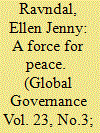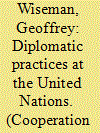| Srl | Item |
| 1 |
ID:
154714


|
|
|
|
|
| Summary/Abstract |
The UN Charter describes him or her merely as the “chief administrative officer of the organization,” yet today the Secretary-General is widely recognized as the UN's chief political representative. How did this transformation and expansion of the office from administrative to political take place? Existing scholarship tends to emphasize the contribution made by Dag Hammarskjöld. This article challenges that story on two accounts: first, by pointing out the importance of institutional factors and not just the officeholder's personality; and second, by examining the contribution made by Trygve Lie, the UN's first Secretary-General. The article establishes a conceptual framework based on institutional theory to understand the role of the Secretary-General and analyzes Lie's contribution in the period 1946–1953.
|
|
|
|
|
|
|
|
|
|
|
|
|
|
|
|
| 2 |
ID:
141722


|
|
|
|
|
| Summary/Abstract |
This article considers the importance of informal, practice-based change as opposed to formal change at the UN. I first evaluate UN reform, showing that diplomacy and institutional change within the UN system are better understood as having evolved less from major, formal reform of the UN Charter (‘the Charter’) than from minor changes in routine practices. I then examine what practice theory and diplomatic studies can learn from each other in terms of how each views the role of leading individuals, illustrating specific practice-based change in relation to the Secretary-General’s role. Next, I show how the appointment process for a new Secretary-General has evolved through informal practice, after which I advance an argument that UN diplomatic practices should be considered not only within the narrow context of a formal diplomatic corps of member state diplomats but also as part of an informal, wider diplomatic community of diplomats and non-state actors. Practice theory helps students of diplomacy think more abstractly and systematically about mundane diplomatic practices. Students of diplomacy can help guide practice theory toward empirical diplomatic activities that are often internalized and taken for granted. I conclude that a dialog between the two fields will promote a better understanding of diplomacy as undervalued practices.
|
|
|
|
|
|
|
|
|
|
|
|
|
|
|
|